They believe God will kill her in a great war
Originally published on Danish Media, TV2 by Jonas HR Moestrup
She raised her children to reject apostates. Now she herself is an apostate and struggles for the children to accept her choice.
Maria Alexander sat opposite her two youngest children at the dining table and was supposed to eat dinner.
Just as she was about to take her first bite, her 13-year-old son broke in.
– May we first say prayer?
– You may like to, but I don’t want to, replied Maria Alexander.
“But mother, why don’t you think of God anymore?” Asked her 11-year-old daughter.
A few months earlier, Maria Alexander had made a choice that her children had difficulty accepting. Time and again they brought it up when they were with their mother. She no longer wanted to follow God’s word.
– That means you are going to die. You are going to die in Armageddon, said the son.
This is how Maria Alexander remembers the dialogue at the dining table on a spring day in 2015.
It wasn’t the cozy night she had hoped for. It ended in a quarrel and she broke down. She called her children brainwashed. She tried to get them to understand the world as she saw it now. Shortly afterwards, her children were taken by their father. A year passed before Maria Alexander saw them again.
Although this can be very difficult, we must avoid having unnecessary contact with a disfellowshipped family member
Text from Jehovah’s Witnesses
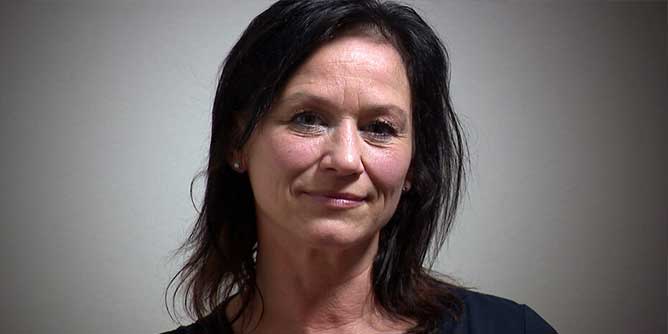
Maria Alexander is 47 years old. She spent the first 43 years of her life in the worldwide religious organization of Jehovah’s Witnesses.
This is Maria Alexander’s story, which she remembers her life before, during and after the break from Jehovah’s Witnesses.

As a daughter of a so-called elder, a leading member of the congregation, Maria Alexander grew up in a home in Ishøj, which she herself describes as safe and good. But her life was not like most other peers.
Here’s how the elders ‘role is briefly described in Jehovah’s Witnesses’ internal handbook to elders called “Shepherd the Flock of God.”
Each congregation has a body of elders made up of several men. They are leaders of the congregation and guide Jehovah’s Witnesses in all aspects of life for members to follow God’s instructions. Only men can be appointed as elders.
The elders set up “legal” meetings to investigate and judge in everything from smoking to adultery and murder.
Source: Internal manual for elders “Shepherd the flock of God”
As a child, she was not permitted to have classmates home to play, unless her friends first attended Bible studies.
The older she became; the more the religion consumed her life. When she came home from school, her spare time was mostly with Bible studies, volunteer work and congregation meetings. Birthdays, Christmas, and many other festivals were forbidden, and Jehovah’s Witnesses greatly controlled what movies, books, and other entertainment she needed to spend time on.

Photo: JW.org
Maria Alexander regarded her non-believing classmates with pity. Without the right faith, they would not come into paradise and live an eternal life. She was convinced of that.
Even though she was most often happy, it was also an upbringing with a permanent conscience and guilt, for just a wrong thought or action led to a fear of God’s punishment by both themselves and their families.
A punishment that would come in the Great War, Armageddon, which, according to Jehovah’s Witnesses, will arise throughout the world, where God will kill all people who refuse to know the word of the Bible more wisely.
Maria Alexander never doubted – in her brief teenage years – this world view.

At the age of 18, Maria Alexander was married to a spiritually ambitious man who quickly rose in the ranks of Jehovah’s Witnesses. He became so-called ministerial servant and later an elder. Together they had three children, and Maria Alexander was happy for the life she had.
She worked for the first many years in the cleaning industry, but in her mid-thirties she got a job in a municipality.
The colleagues at her new job were not part of Jehovah’s Witnesses, and it became her first real meeting with the outside world in her adult life. She began to reflect on her own perception of the world.
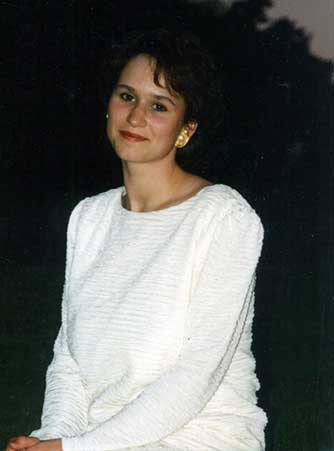
Photo: Private
The doubts came creeping. For how could it be that God would punish these sweet and good people? Kill them? It was not the merciful God she knew.
The years passed, and she became friends with more people outside of Jehovah’s Witnesses. When she asked her husband or others in the congregation, they could not give her a meaningful answer to how God could punish these people.
Doubts became paramount, but she knew what it could mean if she left her religion. She developed what she herself describes as a panic disorder. Everything in her body struggled when she went to congregation meetings.
The words sounded hollow. They didn’t fit with reality. It didn’t make any sense anymore. But could she live with the consequences?
Disfellowshipping helps to protect the purity of the congregation
Text from Jehovah’s Witnesses
The conversation that changed everything
A warm summer evening just over six years ago, Maria Alexander and her husband sat and enjoyed a glass of wine in their house in Faxe Ladeplads, while the kids were playing in their rooms.
She remembers him trying to persuade her to come back to the congregation meetings she hadn’t been to for months.
– I’m beginning to see that there is something wrong here. There is something wrong with this organization, said Maria Alexander.
• It originates from Christianity, but follows its own Bible translation
• Believe that God’s name is Jehovah
• Congregations do not meet in churches, but so-called Kingdom Halls
• Baptism takes place only after years of training and indicates that the baptized will serve Jehovah and the congregation
• Has, according to its own figures, over eight million members worldwide. In Denmark there are almost 15,000
• Managed by a Governing Body based in New York, USA
• Disfellowshipping happens if a member does not regret a serious violation of the rules of religion. Family members are encouraged not to have contact with the disfellowshipped.
Source: JW.org
Her husband thought she had become spiritually weak. That, by coming to the meetings, she could regain the love of Jehovah.
– You know what? I would like to know who you love most: Me or Jehovah, Maria Alexander asked.
She knew the answer well, but she would hear it from his own mouth. The answer was Jehovah.
“Then I want a divorce,” she said.
This is how Maria Alexander remembers the conversation which became a turning point for her. She had made her decision. She would no longer be part of Jehovah’s Witnesses.
Her eldest son distanced himself from the moment he became aware of his mother’s decision. Soon the rest of the family also began to turn their back on her.
But she was convinced that she could still have contact with her two youngest children.
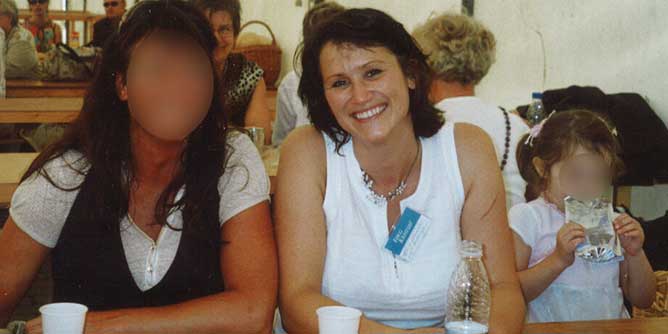
Photo: private.
– Do you think I’m an evil mother?
After the divorce in 2014, Maria Alexander moved herself into a small house in Faxe Ladeplads – near the ex-husband’s house, so she was close to her children.
She had clearly stated to the congregation that she was no longer part of Jehovah’s Witnesses, yet they continued to seek her out.
One day, her two youngest children came home to her after being with their father for seven days. They came dancing in the door and hugged their mother. Ten minutes later, doorbell rang.
There were two well-dressed men at the door. Two elders from the local congregation. They asked Maria Alexander to come back to the meetings. They warned her that she would not survive Armageddon.
She got angry and slammed the door. They should not interfere with her life, she thought. As she turned around, she saw her son crying. He had overheard the conversation with the elders which left him shook. – Mom, that’s what I’ve said. You’re going to die at Armageddon, Maria Alexander remembers him saying.
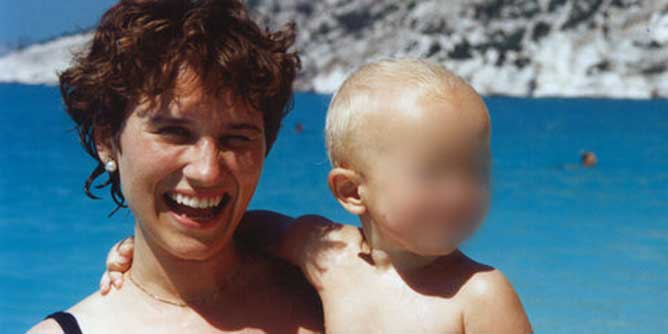
Photo: private
She hugged him and said quietly:
– Do you think I’m an evil mother?
– No.
– Do you think Jehovah will kill me?
– No, but you don’t believe in Jehovah anymore.
“If Jehovah exists, he won’t kill me,” said Mary Alexander.
The following two times, when she had the children at her home, the elders came by again. They stopped only when she threatened to call the police.
A few months later, a selection of elders disfellowshipped her for having been with another man. She lost all contact with family and friends. But she was eager to keep in touch with her children.
Family members can show their love for the congregation and for the offender by respecting the disfellowshipping arrangement.
Text from Jehovah’s Witnesses
Requires answers from the elders
After the evening at the dining table, which ended in quarrel, a year passed before she saw her children again. No one refused her directly to see them – it was their own choice.
According to her, the children could not accept that their mother had chosen a life in the worldly world over the religion.
She sent them text messages almost every day, but most often no answer came. The children were not interested in talking to her. Sometimes they met, but it never amounted to more than that.
It was difficult to accept that the children would no longer be part of her life. But she still had the hope that one day they would return home.
At the same time, she was angry and felt helpless because she felt that the children were influenced by Jehovah’s Witnesses. That it was the organization, the elders, the congregation and her own family that influenced the children to expel their own mother.
She demanded answers from the elders herself, and she decided to go down to the congregation where she used to attend. Here she also hoped to catch a glimpse of her children.
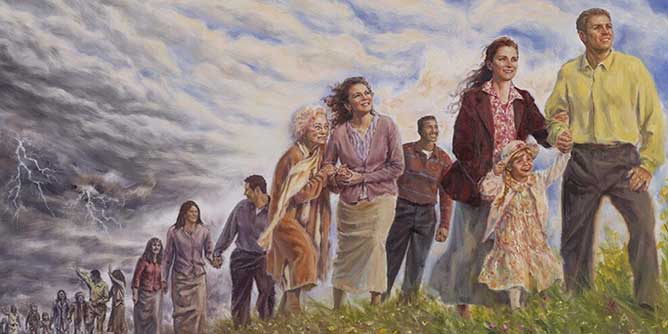
Jehovah’s Witnesses in Denmark and the rest of the world are governed by the so-called New York Governing Body. From here, material – both texts, magazines and films – is produced that is sent out to the branch offices in various countries that translate the material into local languages.

Photo: jw.org
This applies, among other things, to the magazines known as ‘Awake!’ and ‘The Watchtower’, which is often distributed on the street and at people’s personal addresses.
The material is about how to live according to Jehovah’s Witnesses and covers almost every aspect of life.
When members meet in their congregation, they tell each other what they have read. One of the key points is that Jehovah’s Witnesses must not associate with apostates – because they have actively waived the word of God.
For example, in various texts from Jehovah’s Witnesses, it says:
- “Although it can be very difficult, we must avoid having unnecessary contact with a disfellowshipped family member”
- “Disfellowshipping helps protect the purity of the congregation”
- “Family members can show their love for the congregation and for the offender by respecting the disfellowshipping arrangement”
- “Everyone in the congregation can show principled love by avoiding joining or talking to the disfellowshipped one. In this way, they support the discipline Jehovah has given him through the elders.”
Rules that Maria Alexander himself was trained in and passed on to her children.
She therefore blamed herself that her children did not want anything to do with her. But she also greatly blamed the entire organization that, with her words, brainwash her members.
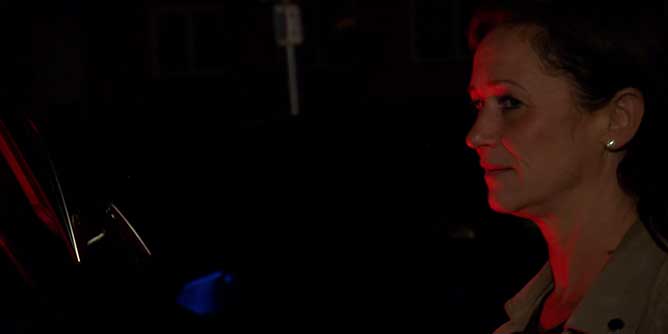
In the fall of 2018, Maria Alexander sat in a chair at the back of the Kingdom Hall – the Assembly Hall of Jehovah’s Witnesses – she used to attend near Faxe. It was the first time since a panic attack made her stay away from the meetings more than six years ago.
She welcomed several former friends and acquaintances when she came in. Friendly, but formally greeted again.
The meeting started. Various speakers went up on the stage and read out selected texts.
Maria Alexander’s heart pounded. The whole congregation sat and accepted all that was said and read from the organization’s books. But she was also nervous about the confrontation she had planned.
She was disappointed as she could not see the kids anywhere. But her ex-husband was there. He ignored her.
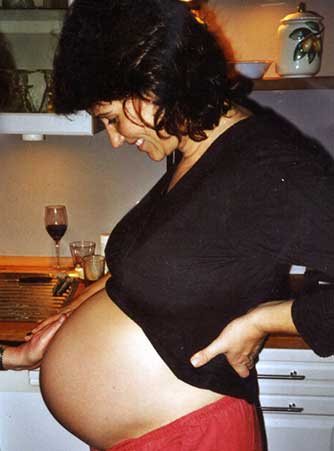
Photo: private
When the meeting was over, Maria Alexander went up to an elder in a gray suit and striped tie. It was one of the elders who helped expel her just under four years ago. Reluctantly, he agreed to ask some questions. He seemed tense. They went into a smaller room and closed the door.
“And what have you to say, Maria?” He said with crossed arms.
– I need to know if you have been urging my children not to have contact with me?
“No,” replied the elder.
– That’s not how I see it.
– No. We have nothing to do with that at all. We do not interfere in that .
There was nothing to come of it.
But it was not surprising. In fact, Maria Alexander was relieved. For even though the children had not been to the meeting and the elder would not answer her question in depth, she felt that she had made progress. She had confirmed that she had made the right choice. Never again would she return to the organization she felt she had wasted 43 years of her life for.
Freedom stands above everything else
Today, the whole of Maria Alexander’s family refuses to see her – both her parents and her sister have turned their back on her. The same applies to her three children. Since that night at the dining table almost four years ago, she has only seen her two youngest children a few times. The last time was two and a half years ago, she says.
Her daughter is 15 today and her youngest son is 17 years old. Her eldest son is 26. She does not know much about what is happening in their lives, but sometimes gets a little knowledge via SMS, when the children answer her.
The loss of her children is a deep wound. But Maria Alexander refuses to return to Jehovah’s Witnesses to be with them. Today she lives with her boyfriend in Copenhagen and has built up a network of friends that she regards as family.
– I’m not going back to that prison. My freedom is above everything else. But of course, I wanted to bring my children along. I think one day they will find out that this world outside is not dangerous, she says.
TV 2 has been in contact with Maria Alexander’s ex-husband and her eldest son. None of them wanted to participate in the article.
Jehovah’s Witnesses did not want to comment on the article.